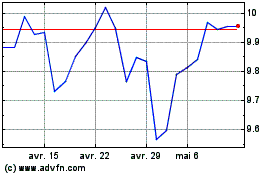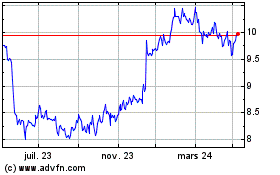Billie Eilish's No. 1 Album Debut Followed Unusual Strategy: No Hit Singles
08 Avril 2019 - 1:59PM
Dow Jones News
By Anne Steele
LOS ANGELES, Calif. -- Budding pop singer Billie Eilish's career
represents a new path to stardom in the digital era.
Ms. Eilish's debut album, "When We All Fall Asleep, Where Do We
Go?," moved more than 313,000 copies in the U.S. in its first week
ending April 4, according to Nielsen Music. That was without a
major radio hit -- typically the main driver of a pop-music
breakthrough.
The success earned the 17-year-old the No.1 slot on the
Billboard 200 albums chart, and the second-largest week of any
album for 2019. Nielsen measures total consumption, including sales
and streams of music.
Since Ms. Eilish signed with Vivendi SA's Interscope Records 2
1/2 years ago, the label has been developing her streaming success
across a collection of early songs -- part of what executives say
is a strategy to build a career versus a one-hit wonder.
Interscope released individual songs on streaming services and
largely eschewed any major push to radio.
With the decline of physical and download sales -- where
listeners pay to own digital copies of albums or tracks --
music-streaming services like Spotify and Apple Music have become
the main source of revenue for the recording industry. With
streaming, listeners pay a subscription or listen to ads in
exchange for online access to essentially all of the world's
music.
But artists and labels make much less from streaming than they
did in the heyday of CD sales, as fans shell out about $10 a month
instead of paying for individual albums or songs.
Before her album was released March 29, Ms. Eilish had sold out
concerts from Los Angeles to Tokyo, performed on late-night
television and raked in almost 8 billion streams for her music,
loosely categorized as "pop," but which features electronic
instruments and hip-hop production from her songwriting partner,
producer and older brother, Finneas O'Connell.
"There was nothing traditional about it," said Interscope Chief
Executive John Janick, referring to the company's approach to
marketing Ms. Eilish.
A week before the album came out, a record 800,000-plus Apple
Music subscribers had "pre-added" the album to their libraries,
meaning it would pop up in their collections as soon as it became
available March 29 -- similar to preordering a download or physical
album online before its release date.
The success of Ms. Eilish marks a departure from today's
hit-driven landscape. When Ms. Eilish was readying to release an
early collection of songs in 2017 her handlers said they felt there
wasn't a likely hit single to carry it.
The label rolled out Ms. Eilish's early songs one by one,
allowing each its moment on new music playlists, and the chance to
generate buzz, before moving on to the next song and landing
multiple on various playlists at the same time.
"With radio things go and then they get pulled and it's on to
the next single and an artist's shelf-life gets cut down," said
Danny Rukasin, her manager. "With Billie this is a much longer-term
project and radio's not going to make or break her long-term
career."
In the past, record labels often gave one retailer -- whether
brick and mortar like Walmart Inc. or Target Corp. or online
services like iTunes -- exclusive rights to sell a major new
release for a week or two, in exchange for a heavy promotional
push. For Ms. Eilish's album, Interscope enlisted every major
streaming service as an ally, doling out secondary promotional
content that each could claim as "exclusive."
Spotify offered "The Billie Eilish Experience," a version of her
album supplemented with visuals and videos interspersed among the
songs.
"We've always looked at streaming as being not like a retailer
-- as being a two-way conversation between artists and listeners,"
said Nick Holmsten, Spotify Technology SA's head of music.
Apple Music released a video animated by Japanese contemporary
artist Takashi Murakami and associated merchandise. Amazon.com Inc.
posted a video in which Ms. Eilish picked out items for purchase to
pair with each of her songs -- such as eye drops for "When the
Party's Over" and a remote-control tarantula car for "You Should
See Me in a Crown," a nod to the song's music video, in which a
spider crawls out of her mouth. For YouTube, she created a
miniseries breaking down the making of three songs from the
album.
Ms. Eilish, who came of age in the streaming era, said the
addition of supplemental visual and video material is a natural
move.
"I was trying to do things I wanted artists to do when I was
younger," she said.
Write to Anne Steele at Anne.Steele@wsj.com
(END) Dow Jones Newswires
April 08, 2019 07:44 ET (11:44 GMT)
Copyright (c) 2019 Dow Jones & Company, Inc.
Vivendi (EU:VIV)
Graphique Historique de l'Action
De Mar 2024 à Avr 2024

Vivendi (EU:VIV)
Graphique Historique de l'Action
De Avr 2023 à Avr 2024
